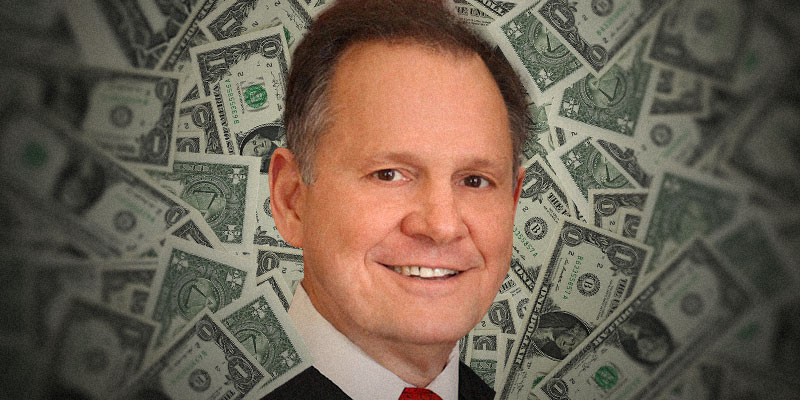
Failed Republican Senate candidate Roy Moore may have solicited funds for a recount that never happened, but federal election law gives him wide latitude in deciding how to spend it.
Paul S. Ryan, vice president for policy and litigation at Common Cause, said Moore could refund that money to the people who gave it.
“If I were a donor to Mr. Moore, I think I’d want my money back,” he said.
But nothing in the law requires Moore to do so. Those funds, along with any other money left over from the Senate campaign, can be used for a wide variety of purposes.
“Some candidates out of good faith give it back,” said Brad Smith, a professor at Capital University Law School in Ohio who previously served on the Federal Election Commission. “But as a general matter, when you give to a candidate, you are giving for him to spend. … There are some who have done that (returned money) from time to time. I would not say that’s common.”
Campaign finance law experts said about the only bright-line restriction is that Moore cannot convert the money for his personal use.
“That, you definitely cannot do,” said Hans von Spakovsky, a Heritage Foundation senior legal fellow who previously served on the Federal Election Commission. “That would get you in a lot of trouble.”
It is unclear how much money Moore has, and a spokeswoman for the former state Supreme Court chief justice did not return a phone call seeking comment. According to Moore’s last campaign finance report on Nov. 22, he had $636,046 cash on hand in his race against Democrat Doug Jones in the special election to fill the seat once held by Attorney General Jeff Sessions. A solicitation email sent by the campaign a few days ago claimed to have raised $71,375 for its “election integrity” effort.
Ryan said losing candidates typically do not end campaigns with much money. But depending on how successful Moore was in generating additional contributions to support a possible recount, his coffers might be healthier than the typical candidate.
Moore has lots of options.
“The list of what he cannot do is much shorter than the list of what he can do,” Ryan said.
The options include keeping the campaign account active for use in a future race. If it is another federal race, according to experts, there are few restrictions. Transfers from a federal campaign account to a state campaign might be limited based on state law. But Alabama lightly regulates campaign spending and has no restrictions on how much money donors can give.
Moore could give the money to a party or leadership political action committee, although given his contentious relationship with GOP leaders, that would seem to be an unlikely choice. He could give to a university or charities. He could contribute money to other candidates, subject to normal limits on campaign contributions.
Or he could convert his campaign fund to a super PAC, which has fewer regulations on how money can be spent. Ryan said that is a popular route for ex-politicians who go into lobbying. The ability to dole out campaign contributions makes a lobbyist all the more effective, he said.
Moore could also do something that seems quaint in modern politics — he could return the money to the people who donated it.
“It doesn’t happen a lot, but it does happen,” Ryan said.
Smith said Moore could donate the funds to a university or a nonprofit organization.
“It’s fairly common to give to a private nonprofit or some entity aligned with the candidate’s views,” he said.
For Moore, that could mean transferring the money to the Foundation for Moral Law, an organization he founded to promote Christian values in the law.
FEC regulations would allow the transfer as long as the donated money is not used to pay salaries of Moore or his wife or benefit them personally in some other way. Ryan offered an example of a prohibited use that would involve a campaign endowing a position at a university and then the school hiring the candidate for that position.
Smith said a circumstance in which Moore contributed leftover campaign funds to his foundation and then took a salary would constitute a legal gray area.
The foundation became an issue in the campaign, dating to the primary. Moore’s opponents accused him of using the foundation to enrich his family.
Ryan said that at the very least, the receiving organization would have to demonstrate a separate stream of revenue that would be sufficient to pay the candidate’s salary. He said it is a question that is best avoided.
“From a public policy standpoint, that would be far from an ideal scenario,” he said.
Brendan Kirby is senior political reporter at LifeZette.com and a Yellowhammer contributor. He also is the author of “Wicked Mobile.” Follow him on Twitter.
(What should Roy Moore do with the money? Take this article over to social media and start a conversation with your family and friends.)
Don’t miss out! Subscribe today to have Alabama’s leading headlines delivered to your inbox.